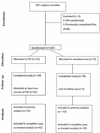A randomized controlled trial of a tailored group smoking cessation intervention for HIV-infected smokers
- PMID: 22732470
- PMCID: PMC3568498
- DOI: 10.1097/QAI.0b013e3182645679
A randomized controlled trial of a tailored group smoking cessation intervention for HIV-infected smokers
Abstract
Background: More than half of the persons living with human immunodeficiency virus (HIV; PLWH) in the US smoke cigarettes, and tobacco use is responsible for considerable morbidity and mortality in this group. Little is known about the efficacy of tobacco treatment strategies in PLWH.
Design: Randomized controlled trial comparing Positively Smoke Free (PSF), an intensive group-therapy intervention targeting HIV-infected smokers, to standard care.
Methods: A cohort of 145 PLWH smokers, recruited from an HIV-care center in the Bronx, New York, were randomized 1:1 into the PSF program or standard care. All were offered a 3-month supply of nicotine replacement therapy. PSF is an 8-session program tailored to address the needs and concerns of HIV-infected smokers. The sessions were cofacilitated by a graduate student and an HIV-infected peer. The primary outcome was biochemically confirmed, 7-day point-prevalence abstinence at 3 months.
Results: In the intention-to-treat analysis, PSF condition subjects had nearly double the quit rate of controls (19.2% vs. 9.7%, P = 0.11). In the complete case, as-treated analysis, assignment to PSF was associated with increased odds of quitting (odds ratio(adj) 3.55, 95% confidence interval 1.04 to 12.0). Latino ethnicity and lower loneliness score were predictive of abstinence. The subjects in the PSF condition exhibited significant decreases in daily cigarette consumption and significant increases in self-efficacy and in motivation to quit. Attendance of ≥7 sessions was associated with higher quit rates.
Conclusions: These findings suggest a positive effect of PSF on cessation rates in PLWH smokers. Loneliness and self-efficacy are influential factors in the smoking behaviors of PLWH.
Trial registration: ClinicalTrials.gov NCT01106638.
References
-
- Tesoriero JM, Gieryic SM, Carrascal A, et al. Smoking among HIV positive New Yorkers: prevalence, frequency, and opportunities for cessation. AIDS Behav. 2010;14:824–835. - PubMed
-
- The Data Collection on Adverse Events of Anti-HIV Drugs (DAD) Study Group. Combination antiretroviral therapy and the risk of myocardial infarction. NEJM. 2003;349:1993–2003. - PubMed
-
- Miguez-Burbano MJ, Burbano Z, Ashkin D, et al. Impact of tobacco use on the development of opportunistic respiratory infections in HIV seropositive patients on antiretroviral therapy. Addiction Biology. 2003;8:39–43. - PubMed
Publication types
MeSH terms
Associated data
Grants and funding
LinkOut - more resources
Full Text Sources
Other Literature Sources
Medical


